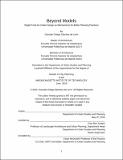Beyond models digital tools for urban design as mechanisms for better planning practices
Author(s)
Ortega Sánchez de Lerín, Gonzalo.
Download1140216945-MIT.pdf (7.699Mb)
Other Contributors
Massachusetts Institute of Technology. Department of Urban Studies and Planning.
Advisor
Eran Ben-Joseph.
Terms of use
Metadata
Show full item recordAbstract
This thesis explores the factors that affect the potential of computational urban design tools as instruments to support the implementation of better urban design practices through more informed and collaborative urban development processes. Contemporary computational tools impact the inception of design ideas; evaluate design outputs objectively at different stages; and assist the further development of the design solutions. These tools streamline the creation of comprehensive and detailed urban design scenarios based on extensive quantitative and qualitative methods which relate to the extensive factors urban design needs to address. The goal is to result in more sustainable, vibrant and equitable developments through urban form, use allocation and other design specifications. However, external factors condition the implementation of these informed urban design practices. Particularly in the case of high-density, mixed-use urban infill projects, regulations and policies determine the possibilities for development and "opportunity space" within which the negotiation and trade-off between stakeholders in these often contentious urban projects takes place (Tiesdell and Adams, 2011). Both regulations and trade-off affect the final definition of an urban design project and the inclusion of better practices. In this context, the thesis explores the pros and cons of computational modeling tools to adequately inform and support better urban design practices within the complexity high-density, mixed-use development processes subject to restrictive regulations and participatory planning processes. An analysis of theory, use cases and the in-depth exploration of the various approaches to urban design in the redevelopment of Kendall Square in Cambridge, Massachusetts leads to multisided results. First, computational modeling tools both empower and limit the capacity of design and planning practitioners through the complexity of their operations. Second, the advanced level of definition of digital tools early in the development process can streamline fundamental phases (e.g. approval, entitlement or design review), thus reducing uncertainty and risk. However, this can also restrict the opportunity space of stakeholders in the pursuit of their interests and impact negatively the implementation of practices that are not enforced by regulations. Third, while the use of digital tools can lead to more interactive and publicly accessible design and planning processes, the complexity of the tools and the information they build on affect their potential for effective communication. This can hinder better decision-making and consensus-building that supports the implementation of better practices. I conclude by providing a series of short recommendations for how to potentially address these issues.
Description
This electronic version was submitted by the student author. The certified thesis is available in the Institute Archives and Special Collections. Thesis: M.C.P., Massachusetts Institute of Technology, Department of Urban Studies and Planning, 2019 Cataloged from student-submitted PDF version of thesis. Includes bibliographical references (pages 90-95).
Date issued
2019Department
Massachusetts Institute of Technology. Department of Urban Studies and PlanningPublisher
Massachusetts Institute of Technology
Keywords
Urban Studies and Planning.